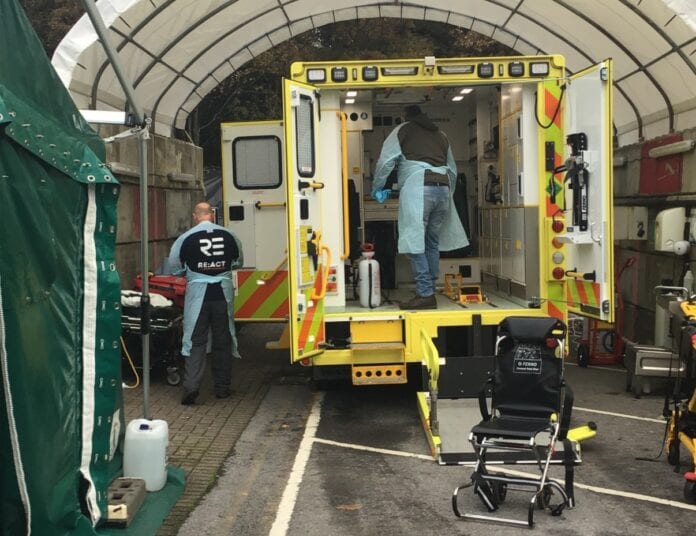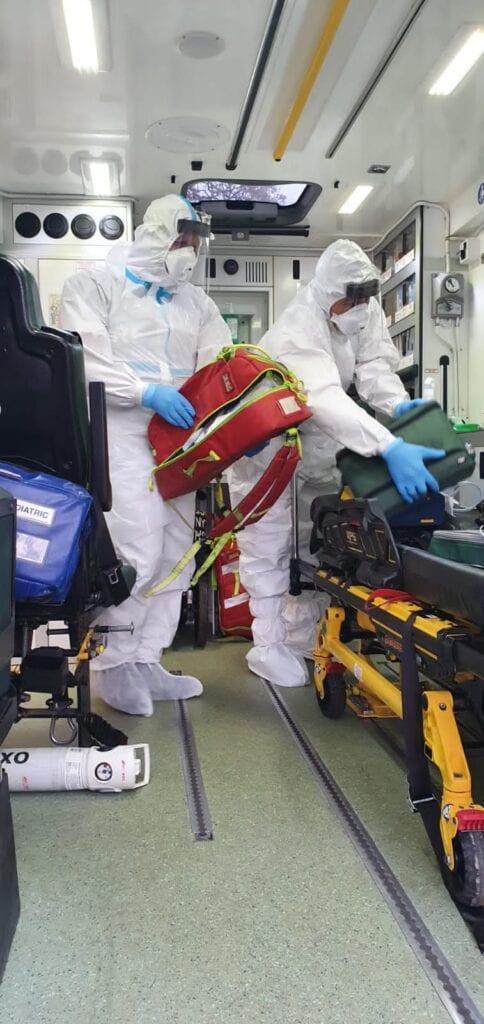The day to day practicalities of dealing with the COVID-19 pandemic are sometimes overlooked by those not working in fields directly intended to deal with those affected by the virus.
COVID-19 is an incredibly virulent disease, and with an even more communicable strain in the UK, sterilisation and cleanliness are absolutely crucial.
When individuals suspected or confirmed to have the virus are moved by ambulance, contagious matter left behind is a serious issue, and proper decontamination procedures need to be followed.
While an ambulance is being decontaminated, it’s taken off the road, which has the effect of potentially putting more strain on those still left in circulation. As such, decontamination being performed quickly is a consideration, as well. It is, however, difficult to be both safe and quick.
Two Make Ready facilities were set up, one in Tredegar, and one in North Wales, for the purposes of decontaminating ambulances to put them back into service, but it was quickly realised that this was somewhat impractical for ambulances operating in South and West wales, due to the distance from an available facility, sometimes leading to ambulances being off-road for several days at a time.
The Welsh Ambulance Service reached out to RE:ACT Disaster Response for assistance with this crucial task in the Swansea area.
RE:ACT Disaster Response is a charitable organisation with a specialty for responding to emergencies and crises in a swift and efficient manner, both in the UK and overseas, including in Mozambique, Sri Lanka, and the Bahamas.
A large number of the organisation’s staff and volunteers are former military personnel, who bring their veteran’s experience and hard-earned skills to every task they confront. They’ve been involved in the response to the COVID-19 pandemic across the country since the beginning, and continue to do so.
As the first wave progressed and it became clear that additional provisions needed to be made for ambulances in the south and west, Singleton Hospital was set up to be able to deal with contaminated ambulances on site, initially staffed by military personnel, but soon RE:ACT was approached to help fill this gap, which they did very successfully for several weeks over the summer, with a large number of their volunteers choosing to help with the crisis.
By October of 2020, as case numbers began to rise in Autumn, RE:ACT was once again tasked with providing their expertise to the job at hand. The response was significant, with all of their volunteers who had stepped forward over the summer returning to the job, and an additional 12 volunteers joining the task.
With such an overwhelming task at hand, RE:ACT approached it with precision. From November 5th through to December 6th, for a full 7 days a week, there were at least two responders in attendance for 12 hours a day.
During this time, they performed an impressive 30 level 3 decontamination. Speaking to RE:ACT Responder Rob Salmon, he described a level 3 decontamination as involving a full chemical cleanse of an affected ambulance’s interior, with all equipment on board taken out and sterilised individually, all while in full personal protective equipment. Additionally, 14 level 2 decontaminations were performed during the same time period.
After this period, a new team was formed to perform decontamination at Singleton Hospital, however, the expertise of RE:ACT’s volunteers was so valued that three of the newly formed team came from RE:ACT itself.
Rob Salmon said: “We have a particular way of working. We were well supported by WAPs, and our volunteers stood up time and time again. Whenever someone couldn’t make a shift, there were always two or three volunteers ready to step in.”
“To ask our members to join the team at Singleton is a testament to their hard work and efficiency.”If you want to know more about RE:ACT, or if you’d like to make a donation to the charity, visit their website here, or if you’d like to make a donation, or were interested in volunteering, visit here.
Help keep news FREE for our readers
Supporting your local community newspaper/online news outlet is crucial now more than ever. If you believe in independent journalism, then consider making a valuable contribution by making a one-time or monthly donation. We operate in rural areas where providing unbiased news can be challenging. Read More About Supporting The West Wales Chronicle



























